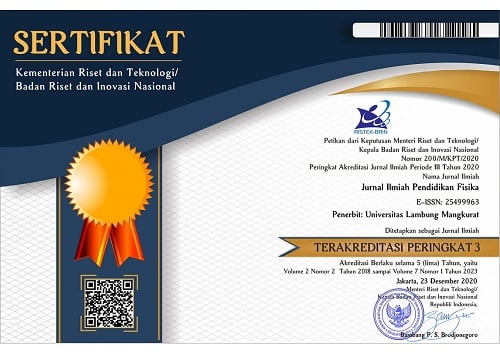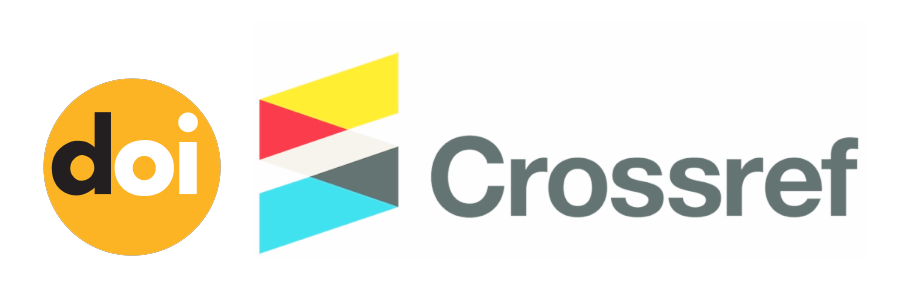Development of Physics Teaching Material with Problem-Based Learning to Train Students’ Problem-Solving Skills
Abstract
In the era of Industry 4.0, problem-solving skills are crucial to address life's increasingly complex and diverse challenges. However, these skills are often not adequately cultivated in schools. This study aims to describe the suitability of physics teaching materials using problem-based learning (PBL) to enhance students' problem-solving skills in the topic of light and optical instruments. This research employs the Dick and Carey development model, involving five validators, ten students in a limited test, and 15 students in an extensive trial. Data is collected using validation instruments, observation of learning, and problem-solving tests. The results of the study indicate that the validation results of physics teaching materials, including lesson plans, teaching materials, student worksheets, and problem-solving tests, are 93, 92, 90, and 92, respectively, with a "very valid" rating. Furthermore, PBL activities in the limited and extensive trials are 84 and 86, respectively, with a "practical" categorization. In conclusion, the physics teaching materials developed using PBL are suitable for training problem-solving skills in physics education. These materials can be applied in secondary school-level education, particularly for light and optical instruments, to enhance students' problem-solving abilities.
Keywords
Full Text:
PDFReferences
Alam, A. (2022). Educational robotics and computer programming in early childhood education: a conceptual framework for assessing elementary school students’ computational thinking for designing powerful educational scenarios. 2022 International Conference on Smart Technologies and Systems for Next Generation Computing (ICSTSN), 1–7. https://doi.org/10.1109/ICSTSN53084.2022.9761354
Andini, S. A., Susanto, & Hobri. (2017). Students’ activity in problem-based learning (pbl) math classroom be oriented lesson study for learning community (lslc). International Journal of Advanced Research, 5(9), 1395–1400. https://doi.org/10.21474/IJAR01/5458
Ariani, R. F. (2020). Pengaruh model pembelajaran problem based learning terhadap kemampuan berpikir kritis siswa sd pada muatan ipa. Jurnal Ilmiah Pendidikan Dan Pembelajaran, 4(3), 422–432.
Azid, N., Ali, R. M., El Khuluqo, I., Purwanto, S. E., & Susanti, E. N. (2022). Higher order thinking skills, school-based assessment and students’ mathematics achievement: Understanding teachers’ thoughts. International Journal of Evaluation and Research in Education, 11(1), 290–302.
https://doi.org/10.11591/ijere.v11i1.22030
Dwita, E. G., & Hidayati, Y. M. (2022). Model pembelajaran problem based learning berbasis video pembelajaran untuk mengembangkan kemampuan pemecahan masalah matematika. Jurnal Basicedu, 6(4), 5868–5876. https://doi.org/10.31004/basicedu.v6i4.3145
Fatmawati, Rivaldi, M., & Suhaeni. (2023). Development of electronic student worksheets based local potential to enhance students’ science learning outcomes. Jurnal IPA Dan Pembelajaran IPA), 56(1), 56–71. https://doi.org/10.24815/jipi.v6i4.29443
Fidan, M., & Tuncel, M. (2019). Integrating augmented reality into problem based learning: The effects on learning achievement and attitude in physics education. Computers & Education, 142, 103635. https://doi.org/10.1016/j.compedu.2019.103635
Fitriani, A., Zubaidah, S., Susilo, H., & Al Muhdhar, M. H. I. (2020). The effects of integrated problem-based learning, predict, observe, explain on problem-solving skills and self-efficacy. Eurasian Journal of Educational Research, 2020(85), 45–64.
https://doi.org/10.14689/ejer.2020.85.3
Gais, Z., Ekasatya, D., & Afriansyah, A. (2017). Analisis kemampuan siswa dalam menyelesaikan soal high order thinking ditinjau dari kemampuan awal matematis siswa. Mosharafa: Jurnal Pendidikan Matematika, 6(2). http://e-mosharafa.org/
Hadiyanti, Y. R., Tandililing, P., & Seralurin, M. M. (2022). Analisis kesalahan peserta didik dalam menyelesaikan soal cerita pada persamaan linear satu variabel berdasarkan prosedur newman. Jupe: Jurnal Pendidikan Mandala, 9(4), 995–1002.
Heri, V., Suratman, D., Bs, D. A., Nursangaji, A., & Fitriawan, D. (2022). Analisis kesalahan peserta didik dalam menyelesaikan soal fungsi. Jurnal Pendidikan Matematika Dan Matematika, 6(2), 133–142. https://doi.org/10.36526/tr.v%vi%i.2132
Indriani, N., & Lazulva. (2020). Desain dan uji coba lkpd interaktif dengan pendekatan scaffolding pada materi hidrolisis garam. JNSI: Journal of Natural Science and Integration, 3(1), 87–105.
Inganah, S., Darmayanti, R., & Rizki, N. (2023). Problems, solutions, and expectations: 6c integration of 21 st century education into learning mathematics. JEMS (Journal of Mathematics and Science Education), 11(1), 220–238.
https://doi.org/10.25273/jems.v11i1.14646
Juwairiah, J., Riana, M., & Windiani, W. (2022). Digitization of laboratory equipment using PhET simulation media in applied chemistry practicum. International Journal of Trends in Mathematics Education Research, 5(2), 169–173.
https://doi.org/10.33122/ijtmer.v5i2.131
Kastriti, E., Kalogiannakis, M., Psycharis, S., & Vavougios, D. (2022). The teaching of natural sciences in kindergarten based on the principles of STEM and STEAM approach. Advances in Mobile Learning Educational Research, 2(1), 268–277.
https://doi.org/10.25082/AMLER.2022.01.011
Khan, R. M. I., Ali, A., Alourani, A., Kumar, T., & Shahbaz, M. (2022). An investigation of the educational challenges during covid-19: a case study of saudi students’ experience. European Journal of Educational Research, 11(1), 353–363. https://doi.org/10.12973/EU-JER.11.1.353
Laksono, P., Wicaksono, A., & Habisukan, U. H. (2023). Pendampingan pemanfaatan simulasi phet sebagai media interaktif virtual laboratorium di mts tarbiyatussibyan. Jurnal Anugerah, 4(2), 179–192. https://doi.org/10.31629/anugerah.v4i2.4843
Lestari, D. D., & Muchlis, M. (2021). E-lkpd berorientasi contextual teaching and learning untuk melatihkan keterampilan berpikir kritis siswa pada materi termokimia. Jurnal Pendidikan Kimia Indonesia, 5, 25–33. https://ejournal.undiksha.ac.id/index.php/JPK/index
Liiman, M., Mulyono, M., & Napitupulu, E. E. (2022). Pengembangan perangkat pembelajaran matematika berbasis pendekatan contextual teaching learning untuk meningkatkan kemampuan pemecahan masalah dan disposisi matematis siswa smp. Jurnal Cendekia : Jurnal Pendidikan Matematika, 7(1), 60–71.
https://doi.org/10.31004/cendekia.v7i1.1844
Polya. (1973). How to solve it. Princeton University Press.
Prasetyo, B. A., Mahardika, I. K., & Sujayanto, N. (2019). Analisis kemampuan siswa kelas vii smp negeri 3 jember dalam menyelesaikan soal un ipa pokok bahasan suhu menggunakan tahapan polya. Fkip E-Proceeding, 4(1), 2527–5917.
Putra, S. H. J. (2021). Pendekatan jelajah alam sekitar (jas): dampaknya terhadap aktivitas dan hasil belajar kognitif siswa smp. In Journal of Natural Science and Integration (Vol. 4, Issue 2).
Rakhmi, M., Suryajaya, & Zaini, M. (2020). Development of science learning set on the topic of changing objects around us. Journal of Advances in Education and Philosophy, 04(03), 111–117. https://doi.org/10.36348/jaep.2020.v04i03.006
Rizal, R., Rusdiana, D., Setiawan, W., & Siahaan, P. (2021). Development of a problem-based learning management system-supported smartphone (PBLMS3) application using the ADDIE model to improve digital literacy. International Journal of Learning, Teaching and Educational Research, 20(11), 115–131.
https://doi.org/10.26803/ijlter.20.11.7
Rizaldi, W. R., Sudirman, S., Saparini, S., & Pasaribu, A. (2022). Pengembangan modul elektronik alat-alat optik berbasis stem menggunakan aplikasi flip pdf professional. Jurnal Ilmiah Pendidikan Fisika, 6(2), 360. https://doi.org/10.20527/jipf.v6i2.5006
Sholahuddin, A., Susilowati, E., Prahani, B. K., & Erman, E. (2021). Using a cognitive style-based learning strategy to improve students’ environmental knowledge and scientific literacy. International Journal of Instruction, 14(4), 791–808. https://doi.org/10.29333/iji.2021.14445a
Siagian, M. V., Saragih, S., & Sinaga, B. (2019). Development of learning materials oriented on problem-based learning model to improve students’ mathematical problem solving ability and metacognition ability. International Electronic Journal of Mathematics Education, 14(2), 331–340. https://doi.org/10.29333/iejme/5717
Simanjuntak, M. P., Hutahaean, J., Marpaung, N., & Ramadhani, D. (2021). Effectiveness of problem-based learning combined with computer simulation on students’ problem-solving and creative thinking skills. International Journal of Instruction, 14(3), 519–534. https://doi.org/10.29333/iji.2021.14330a
Sugano, S. G. C., & Nabua, E. B. (2020). Meta-analysis on the effects of teaching methods on academic performance in chemistry. International Journal of Instruction, 13(2), 881–894. https://doi.org/10.29333/iji.2020.13259a
Sulikah, W., Setyawan, A., & Citrawati, T. (2020). Sulikah identifikasi hasil belajar siswa muatan ipa materi perubahan wujud benda kelas v. Prosiding Nasional Pendidikan: LPPM IKIP PGRI Bojonegoro, 1(1), 551–556.
Surya, E., Simamora, R. E., & Rotua Sidabutar, D. (2017). Improving learning activity and students’ problem solving skill through problem based learning (pbl) in junior high school. International Journal of Sciences Basic and Applied Research, 33(2), 321–331. http://gssrr.org/index.php?journal=JournalOfBasicAndApplied
Surya, E., & Syahputra, E. (2017). Improving high-level thinking skills by development of learning pbl approach on the learning mathematics for senior high school students. International Education Studies, 10(8), 12. https://doi.org/10.5539/ies.v10n8p12
Sutarto, Dwi Hastuti, I., Fuster-Guillén, D., Palacios Garay, J. P., Hernández, R. M., & Namaziandost, E. (2022). The effect of problem-based learning on metacognitive ability in the conjecturing process of junior high school students. Education Research International, 2022, 1–10. https://doi.org/10.1155/2022/2313448
Suttrisno, S., & Puspitasari, H. (2021). Pengembangan buku ajar bahasa indonesia membaca dan menulis permulaan (mmp) untuk siswa kelas awal. Jurnal Penelitian Pendidikan Dan Pembelajaran, 8(2), 83–91. https://doi.org/10.21093/twt.v8i2.3303
Suyidno, S., Haryandi, S., Mahtari, S., Azhari, A., & Sunarti, T. (2022). Autonomy-based creative learning: equip creativity and concern for prospective physics teachers in wetland environments. Journal of Physics: Conference Series, 2392(1). https://doi.org/10.1088/1742-6596/2392/1/012027
Tampubolon, R., Sinaga, B., & Mulyono, M. (2021). Pengembangan perangkat pembelajaran berbasis masalah untuk meningkatkan kemampuan pemecahan masalah siswa sma negeri 17 medan. Paradikma: Jurnal Pendidikan Matematika, 14(1), 16–28.
Wahyuni, N. P. (2021). Penerapan pembelajaran berbasis stem untuk meningkatkan hasil belajar ipa. Journal of Education Action Research, 5(1), 109–117. https://ejournal.undiksha.ac.id/index.php/JEAR/index
Wati, D. D. E. (2021). Validitas buku panduan penyusunan rencana pelaksanaan pembelajaran (rpp) yang terintegrasi kecakapan abad 21. Physics and Science Education Journal (PSEJ), 108–115.
Wulandari, T., & Mudinillah, A. (2022). Efektivitas penggunaan aplikasi canva sebagai media pembelajaran ipa mi/sd. Jurnal Riset Madrasah Ibtidaiyah (JURMIA), 2(1), 102–118. https://doi.org/10.32665/jurmia.v2i1.245
Yatul, U. D., & Fitri, A. (2022). Analisis kebutuhan modul matematika untuk meningkatkan kemampuan pemecahan masalah siswa smp n 4 batang. Journal of Nusantara Education, 2(1). http://journal.unu-jogja.ac.id/fip/index.php/JONED
Zahro, L., & Irawan, E. (2022). Efektivitas model pembelajaran think talk write (ttw) dengan pendekatan scientific literacy terhadap keterampilan presentasi peserta didik mts kelas viii. Jurnal Tadris IPA Indonesia, 2(1), 35–44. http://ejournal.iainponorogo.ac.id/index.php/jtii
Zain, F. M., Sailin, S. N., & Mahmor, N. A. (2022). Promoting higher order thinking skills among pre-service teachers through group-based flipped learning. International Journal of Instruction, 15(3), 519–542. https://doi.org/10.29333/iji.2022.15329a
DOI: https://doi.org/10.20527/jipf.v7i3.9395
Refbacks
- There are currently no refbacks.
Indexed by: Jurnal Ilmiah Pendidikan Fisika is licensed under a creative commons attribution-share alike 4.0 international license
Statistics Counter |
















